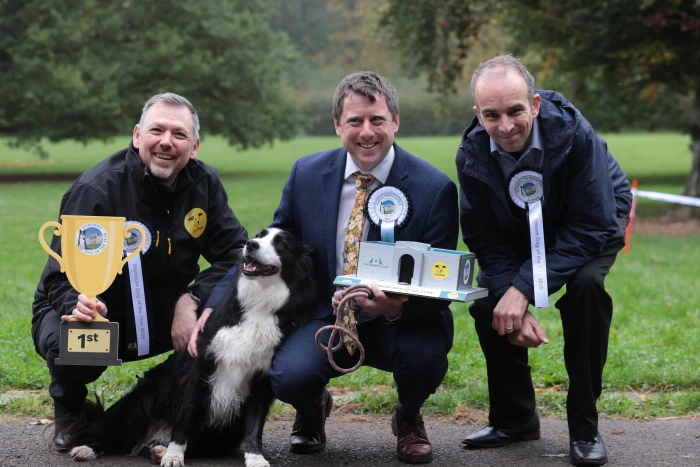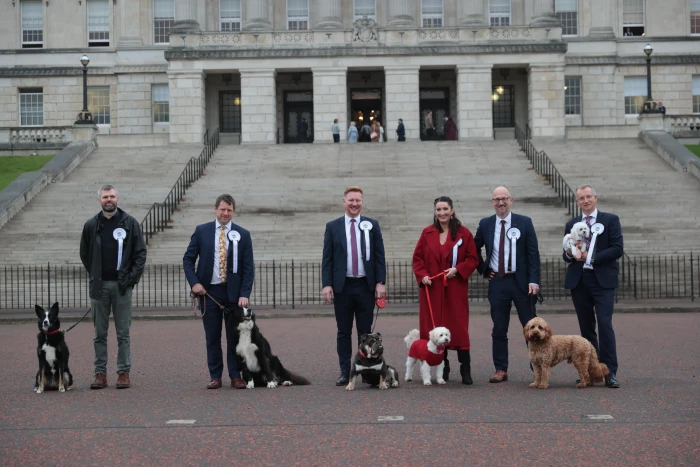

Stormont Dog of the Year crowned its first winner at the joint Dogs Trust and The Kennel Club event earlier this month (14th October), with Andrew McMurray MLA and his Bordernese Rey taking home the trophy.
Whilst the event provides the opportunity to have light-hearted engagement with MLAs, and to meet their lovely doggies, it does have an important purpose. That is, to put canine welfare issues at the forefront of political discussion and decision making.
Northern Ireland is a region of animal owners, lovers, and advocates; rescuing, rehoming, and speaking out for dogs. However, there is a gap. The welfare needs of our four-legged friends are not suitably protected in legislation and the enforcement of it.
There are three primary areas which require legislative change to ensure adequate, long-term, protective measures for owned animals and deliver systemic change in the puppy industry.
1. Regulation of Rehoming Organisations and Pounds
At present anyone can set up an Animal Welfare Establishment (i.e. rescue, rehoming or sanctuary) without any licencing, regulation, or regular inspection.
This creates a multi-layered welfare risk, not just for the animals involved, but for those choosing to rehome a dog and those working in rehoming organisations.
The sector itself has long called for licencing and regulation. This would ensure that organisations operating with the highest standards are recognised, those actively working to attain those high standards are supported, and those not meeting them are penalised.
A case earlier this year in Billericay England, found 37 dead dogs at a property, with a further 20 taken into care at what was believed to be a rescue centre. This highlights the need for all animal rescues to be subject to licensing and inspection, ensuring that any proposed regulation includes those that rehome domestically and from overseas.
With approximately 40 rehoming organisations operating in Northern Ireland, it is imperative that organisations are, at a minimum meeting the five welfare needs of the animals in their care, and that this can be appropriately assessed and monitored. Scotland has implemented regulation of rehoming aligned with the ADCH voluntary minimum operational and welfare standards, which could be similarly used as a requisite baseline standard for organisations.
Included in this regulation should be both Council operated and tendered pound and kennelling facilities. Northern Ireland has the largest stray dog population in the UK, with 2755 dog being dealt with by Councils is 2024-2025. These large numbers of dogs are some of the most vulnerable, and it is imperative that our Councils, as the enforcement agencies of the current legislation, are acting without impunity.

MLAs and their dogs: Gerry Carroll, Laoise; Andrew McMurray, Rey; Daniel McCrossan, Hudson; Emma Little Pengelly, Ruby; Peter Martin, Maxwell; Brian Kingston, Rosie.
2. Ban on third party sale and supply of puppies
Northern Ireland is the only region of the UK without a ban on the commercial third-party sale of puppies (and kittens), known in Great Britain as ‘Lucy’s Law.’
Lucy's Law prohibits the sale of puppies and kittens by third-party sellers, such as pet shops, requiring buyers to deal directly with the breeder or an animal rehoming centre.
This is important because when a breeder is not responsible for their animal there can be a dereliction of duty. Dogs are bred, moved, and sold without sufficient safeguards and protections and unscrupulous practices, such as puppy smuggling, which put profit above welfare, occur. Only a system of buying and selling which has full traceability, transparency and sustainability can suitably protect - safeguarding not just the animals, but those choosing to purchase a dog.
The Department of Agriculture, Environment and Rural Affairs (DAERA) consulted on the proposed introduction of a ban on third party sales of puppies (and kittens) earlier this year, and we await with interest the publication of the overview of consultation responses. DAERA Minister Andrew Muir has long signalled his intent to introduce a ban and being the last region of the UK to introduce this, allows us the opportunity to learn from our neighbours and close legislative loopholes.
Our message to both DAERA and local Councils is do not be limited in your ambition. Despite the shortened political mandate, and the pressures on resources this is once in a generation opportunity to strike at the heart of the sale and supply of low welfare puppies (and kittens) in Northern Ireland. A ban on third party sale and supply as part of a comprehensive packages of measures including improved traceability of breeders can exponentially improve animal welfare.
3. Improved breeding regulation
Northern Ireland holds the dubious accolade of having the first, second, third and fourth highest number of dogs (bitches and studs) on any individual breeding licence in the UK or Ireland, with 350 the most of any licensee.
Even to the uninitiated, the breeding of puppies on this industrial scale is obscene. Northern Ireland is the heart of the production and export market for low welfare puppies.
It is simply not possible for an operation of this size to suitably meet the needs of the animals in its care, be that social, physical, behavioural, or other. With no regulation on number of attendants per animal, and no limit on the number of animals per licence it is a recipe for neglect and harm.
Minister Muir convened the Expert Advisory Group on Breeding Regulations in July this year and we are pleased to have met with them as Chair of the Northern Ireland Companion Animal Welfare Group (NICAWG) to discuss our concerns.
However, the breadth and scale of breeding issues in Northern Ireland is unmatched. We need a review that not just promises reform, but prescribes, promotes, and propels it. The Minister must harness his very welcome political ambition for animal welfare and match it with sufficient legislative proposals, backed with expertise, resource and scope for enforcement.
The animal welfare sector is unified on and ready for much needed change to be breathed in to outdated and insufficient legislation. We are ready to work together with political decision makers, enforcement agencies, other charities, and the wider public to ensure that every dog has its day.
Laura Orr is Regional Public Affairs Officer (Northern Ireland) for Dogs Trust. She works to inform and engage political decision makers on animal (primarily doggy) welfare issues, and to deliver improved legislation and enforcement for people and their pets.
Dogs Trust is Chair of the Northern Ireland Companion Animal Welfare Group (NICAWG). NICAWG is a sector group that brings together expertise and focus on animal welfare issues and works collectively to improve the lives of companion animals and their owners.
Prior to working at Dogs Trust Laura spent over a decade in the health sector working for charities, professional bodies, and trade unions.
Outside of work Laura is a Board member of Breastival and Acacia Path and campaigns with Action on Postpartum Psychosis.
Pivotal Platform is a home for guest writers to contribute their perspectives on public policy debates in Northern Ireland. The views expressed by guest writers are not necessarily those of Pivotal.





